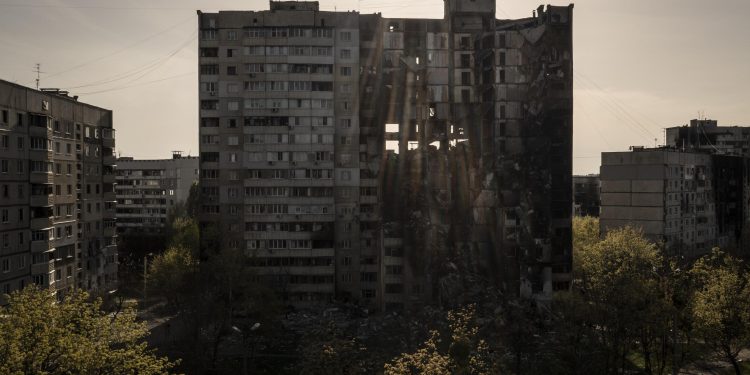Kyiv: An uneasy calm hung over Kyiv Tuesday as residents of the Ukrainian capital did what they could to prepare for anticipated Russian missile attacks aiming to take out more energy infrastructure as winter sets in.
To ease that pain, NATO allies were making plans to boost provisions of anything from blankets to generators to ensure the 43 million Ukrainians can maintain their resolve in the 10th month of fighting against Russia’s invasion.
Ukraine’s first lady implored the West to show the same kind of steadfastness that Ukrainians had shown against Russian President Vladimir Putin’s military campaign.
“Ukrainians are very tired of this war, but we have no choice in the matter,” said Olena Zelenska, the wife of President Volodymyr Zelenskyy, in a BBC interview during a visit to Britain.
“We do hope that the approaching season of Christmas doesn’t make you forget about our tragedy and get used to our suffering,” she said.
A two-day meeting of NATO foreign ministers in Bucharest, Romania, was likely to see the 30-nation alliance make fresh pledges of nonlethal support to Ukraine: fuel, generators, medical supplies and winter equipment, on top of new military support.
US Secretary of State Antony Blinken was to announce substantial US aid for Ukraine’s energy grid, US officials said
Ukraine’s grid has been battered countrywide since early October by targeted Russian strikes, in what Western officials call a Russian campaign to weaponise the coming winter cold.
Ukrainians are putting up defences — both for troops and for civilians. The government has rolled out hundreds of help stations, christened Points of Invincibility, where residents facing outages of power, heating and water can warm up, charge their phones, enjoy snacks and hot drinks, and even be entertained.
“I had no electricity for two days. Now there’s only some electricity, and no gas,” said Vanda Bronyslavavina, who took a breather inside one such help center in Kyiv’s Obolon neighbourhood.
The 71-year-old lamented the uncertainty about whether Russia will simply resume its strikes after infrastructure gets fixed, in a frustrating cycle of destruction and repair.
It underscored how the war continues to cast a pall over every aspect of life, even if civilian casualties are relatively low at the moment.
Kyrylo Tymoshenko, the presidential office’s deputy head, said Russian forces overnight fired on seven regions in Ukraine’s south and east, employing missiles, drones and heavy artillery. At least one civilian was killed and two wounded.
Tymoshenko said that as of Tuesday, power had been restored to 24% of residents in the hard-hit southern city of Kherson.
On the battlefields in the eastern Luhansk region, the regional governor said Ukrainian forces were continuing a slow advance, pushing toward Russian defense lines set up between two key cities. Serhiy Haidai acknowledged in televised remarks, though, that the onset of winter was compounding a “difficult” battlefield situation.
The prospect of any peace remained remote. The Kremlin reaffirmed Tuesday that negotiations could only be possible if Ukraine meets Russian demands. Kremlin spokesman Dmitry Peskov told reporters that “it’s impossible to hold any talks now because the Ukrainian side strongly rejects them”.
He noted that “political will and readiness to discuss the Russian demands” are needed to conduct negotiations.
Russia has demanded that Ukraine recognise Crimea as part of Russia and acknowledge other Russian gains. It also has repeated its earlier demands for “demilitarisation” and “denazification,” albeit with less vigour than in the past.
AP






































